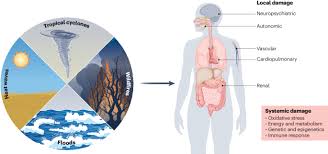Understanding Human Health: A Comprehensive Guide
Human health is a state of complete physical, mental, and social well-being, not just the absence of disease or illness. The complex and interconnected systems of the human body are constantly working to maintain this balance, ensuring proper functioning and resilience against illness. However, achieving and maintaining optimal health requires a conscious effort in many aspects of life, including nutrition, exercise, mental health, and lifestyle choices. Read More
The Importance of Nutrition
Good nutrition is fundamental to maintaining a healthy body. Our bodies need a variety of nutrients, including proteins, carbohydrates, fats, vitamins, and minerals, to function properly. These nutrients are obtained through the food we eat. A balanced diet that includes a variety of fruits, vegetables, whole grains, lean proteins, and healthy fats is key to promoting good health. Read More
Deficiencies in certain nutrients can lead to health problems. For instance, a lack of vitamin D can cause bone disorders, while insufficient iron intake may lead to anemia. On the other hand, overeating and poor food choices, such as consuming too many processed foods and sugary drinks, can contribute to obesity, heart disease, and diabetes.
The Role of Physical Activity
Regular physical activity is another pillar of good health. Exercise not only strengthens the muscles and bones but also improves cardiovascular health, boosts the immune system, and helps regulate weight. It has been shown to reduce the risk of chronic conditions like hypertension, diabetes, and certain cancers. Read More
Physical activity also has a profound effect on mental health. It has been linked to improved mood, reduced stress, and better sleep. Exercise releases endorphins, known as the "feel-good" hormones, which can elevate mood and combat anxiety and depression.
Mental and Emotional Health
Mental health is an often overlooked aspect of overall well-being. It refers to how we think, feel, and behave, as well as how we handle stress, relate to others, and make decisions. Mental health issues, such as anxiety, depression, and stress, can have a significant impact on overall health, affecting physical health and quality of life. Read More
Taking care of mental health involves maintaining positive relationships, managing stress, seeking professional help when necessary, and practicing self-care. Techniques such as mindfulness, meditation, and relaxation exercises can reduce stress and help individuals remain mentally resilient in the face of challenges.
Preventive Healthcare
Preventive healthcare involves measures taken to prevent diseases before they occur, rather than just treating them after they arise. Regular check-ups, vaccinations, and screenings are vital aspects of preventive health. Early detection of health issues through routine screenings for conditions such as cancer, diabetes, and high cholesterol can lead to better outcomes and prevent the development of more serious problems. Read More
A good example of preventive health is vaccination, which has played a crucial role in reducing the incidence of diseases like polio, measles, and flu. By preventing illness, individuals can lead healthier, longer lives and avoid the significant costs and hardships associated with treating chronic diseases.
The Impact of Lifestyle Choices
Lifestyle choices such as smoking, alcohol consumption, and stress management also significantly affect human health. Smoking is one of the leading causes of preventable diseases, including lung cancer and cardiovascular diseases. Excessive alcohol consumption can lead to liver damage, mental health issues, and an increased risk of accidents.
On the other hand, healthy lifestyle habits like getting adequate sleep, staying hydrated, and practicing good hygiene can prevent many health issues. Good sleep is essential for physical and mental recovery, while drinking enough water helps maintain proper body functions. Read More
Human health is a multifaceted concept that involves physical, mental, and emotional well-being. By focusing on proper nutrition, regular exercise, mental health care, and preventive healthcare, individuals can improve their quality of life and increase their chances of living longer, healthier lives. Additionally, making conscious lifestyle choices, such as avoiding harmful habits and managing stress, can significantly contribute to overall well-being. As we continue to navigate the complexities of health, it is essential to adopt a holistic approach to maintain balance and achieve optimal health.



